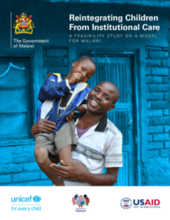In less than a decade, the number of Child Care Institutions (CCIs) in Malawi has increased significantly from 104 institutions in 2011 to 168 in 2014 and 169 in 2017. However, since 2014, the number of children in institutional care has decreased from 10,136 in 2014 to 8,049 in 2017, attributed mainly to the pioneering Reintegration Programme currently being implemented in Blantyre, Dedza, Lilongwe and Mangochi, and the closure of some CCIs due to financial challenges. Malawi’s National Policy on Orphans and other Vulnerable Children emphasises that children should grow up in a family environment and into the broader community where they can socialise with fellow children, and that institutionalisation should be the last resort. This policy direction for Malawi is in line with the 1989 Convention on the Rights of the Child and the 2010 UN Guidelines for Alternative Care of Children.
Globally the trend is towards deinstitutionalisation of children as it is well established that institutional care is not in the children’s best interests. In 2014, the Ministry of Gender, Children, Disability and Social Welfare (MoGCDSW) conducted the country’s first Reintegration Study. The results of this study informed the development of the Reintegration Framework, which consisted of the following five critical steps to be followed when reintegrating a child:
1. Careful, rigorous and participatory assessment and decision making about the suitability of a child and family for reintegration.
2. Preparing the child, family and community for reintegration.
3. Carefully planned reunification.
4. Restoring trust and rebuilding relationships through extensive follow-up support to the child and family.
5. Restoring trust and rebuilding relationships through work with the broader community.
The Reintegration Study recommended a feasibility study in order to determine whether the Reintegration Framework would be effective in reintegrating children with their families or other forms of alternative familybased care for children. The target was that 400 children be reintegrated over the period 2016-2017. The specific objectives of the feasibility study were to:
- Assess the implementation of the Reintegration Framework as recommended by the Reintegration Study.
- Determine factors which promote or hinder the implementation of the Reintegration Programme.
- Develop a Reintegration Model for Malawi.
This report presents the Reintegration Model based on the implementation of the Feasibility Study.

